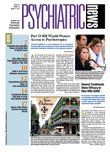APA has announced the members of a task force that will oversee the drafting of the Diagnostic and Statistical Manual of Mental Disorders: Fifth Edition (DSM-V), which is due to be published in 2012.
“The DSM plays a vital role in assuring that patients get proper diagnoses and treatments for their mental health concerns,” said David Kupfer, M.D., chair of the Department of Psychiatry at the University of Pittsburgh School of Medicine, who has been appointed chair of the DSM-V Task Force. The vice chair is Darrel Regier, M.D., M.P.H., director of APA's Division of Research and executive director of the American Psychiatric Institute for Research and Education.
In addition, William Narrow, M.D., M.P.H., associate director for diagnosis and classification in the APA Division of Research, will serve as the research director, and Maritza Rubio-Stipec, Sc.D., will be the statistics and methods director.
The task force represents a wealth of expertise in clinical practice and research. At least 20 task force members have been involved with the National Institutes of Health (NIH), in capacities ranging from receiving NIH research funding to being employees of the agency. For example, two task force members are currently division directors at the National Institute of Mental Health, and one is a section chief. At least 20 task force members are editors or on the editorial boards of major medical journals.
“Recognizing the concern about connection to the pharmaceutical industry, the APA Board of Trustees established clear limits on relationships with industry that are more stringent than those set by federal agencies and academic institutions,” said APA President Carolyn Robinowitz, M.D., while pointing out that the industry funds two-thirds of the medical research in the United States. “APA intends to have the best minds to work on the DSM—our patients deserve no less.”
All task force nominees were required to disclose competing interests or potentially conflicting relationships with entities that have an interest in psychiatric diagnosis and treatment as a precondition for appointment. In addition, all task force members have agreed that, for calendar year 2007 and continuing for the duration of each individual member's work on the task force, the member's total annual income derived from industry sources (excluding unrestricted research grants) will not exceed $10,000. Of the 27 task force members, eight had no relationship with the industry, and 19 disclosed that they had a relationship with industry within the 36-month period before their nomination.
Kupfer and Regier indicated that major updates in the new edition of DSM will be based on the extensive advances in scientific research in recent years. Elements of the manual that will see substantial revisions include more precise diagnoses and criteria based on clinical evidence, discussion on comorbidities, life span and developmental issues in chronic psychiatric disorders, and the interface between diseases of the central nervous system and other organ systems.
In addition, DSM-V will address cross-cultural applicability in mental health with an international perspective. Particular attention will be paid to addressing gender differences in psychiatric disorders.
Preparation for DSM-V, including review of research evidence, began in 1999. More than 280 researchers, of whom almost half were from outside of the United States, have participated in conferences in the past four years that focused on the research base for individual disorders.
APA expects to announce members of approximately 15 work groups in early fall, when preliminary activities of the work groups begin. More than 1,000 contributors will be involved in the preparation and review of DSM-V by the time of its publication. Draft criteria of individual disease areas will be available for field trial and review around 2009. The final publication is projected to be released in 2012.
The following are the members of the DSM-V Task Force. Rapporteurs are responsible for coordinating and facilitating discussion on comorbidity issues between work groups.
David Kupfer, M.D., chair
Darrel Regier, M.D., M.P.H., vice chair
William Narrow, M.D., M.P.H., research director
Maritza Rubio-Stipec, Sc.D., statistics and methods director
William Carpenter Jr., M.D., chair, Psychosis Work Group
Francisco Xavier Castellanos, M.D., chair, Externalizing Disorders Work Group
Wilson Compton, M.D., M.P.E.
Joel Dimsdale, M.D., chair, Somatoform Disorders Work Group
Javier Escobar, M.D., M.Sc.
Jan Fawcett, M.D., chair, Mood Disorders Work Group
Steven Hyman, M.D., rapporteur, Mood Spectra Study Group
Dilip Jeste, M.D., chair, Dementia, Delirium, and Amnestic and Other Cognitive Disorders Work Group; rapporteur, Psychiatric/General Medical Interface Study Group
Helena Kraemer, Ph.D.
Daniel Mamah, M.D., M.P.E.
James McNulty, Sc.B.
Howard Moss, M.D.
Charles O'Brien, M.D., Ph.D., chair, Substance-Related Disorders Work Group
Roger Peele, M.D.
Katherine Phillips, M.D., chair, Anxiety Disorders Work Group
Daniel Pine, M.D., chair, Childhood/Adolescent Disorders Work Group; rapporteur, Developmental Study Group
Charles Reynolds III, M.D., chair, Sleep Disorders Work Group
Andrew Skodol II, M.D., chair, Personality Disorders Work Group
Susan Swedo, M.D., chair, Autism and Other PDD Work Group
B. Timothy Walsh, M.D., chair, Eating Disorders Work Group
Philip Wang, M.D., Dr.P.H.
William Womack, M.D.
Kimberly Yonkers, M.D., rapporteur, Gender and Cross-Cultural Study Group
